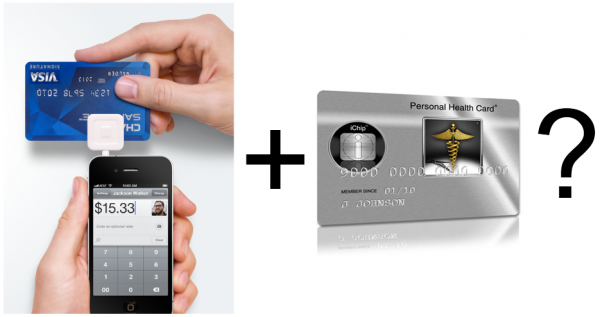This Fast Company article about the hot credit card-processing startup Square (their product is on the left side of the above image) got me thinking about health data, especially this snippet:
Rabois says Square was designed to be the “Google Analytics” of small- to medium-size businesses, and unlike traditional POS systems, the app’s simple dashboard design takes virtually no training to understand. All sales are tracked to the Nth degree, enabling merchants to easily compare, for example, their price of a cappuccino to a local competitor’s, to the neighborhood cafes’, or to the city’s coffee shops as a whole.
What if we could apply the same powerful simplicity to healthcare data? Providers could compare not only prices but also any other healthcare metrics that can be tracked. Patients could also compare prices and maybe even service ratings.
About an hour after reading that Fast Company article, I saw a tweet linking to a Medgadget blog post about a new personal health card from LifeNexus (this is the product shown in the right side of the above image). The LifeNexus Personal Health Payment Card is an all-in-one solution that stores a patient’s health record on a chip that’s embedded in what is essentially a credit card that can be used to pay for healthcare services. Here’s a snippet from that post:
An individual’s personal health record is stored on the card’s embedded microcomputer, the iChip, which is encrypted and password-protected, providing a highly secure environment that the individual owns and controls…The multi-functionality of the LifeNexus Personal Health Payment Card(TM) provides an additional and exceptional benefit. If individuals choose to have the Personal Health Card on a payment card, they can make purchases, providing a convenient way to manage their health-related information and make general day-to-day purchases on the same card.
For the time being, Square-like analytics don’t seem to be in the strategic cards for LifeNexus, as they are marketing their solution as an alternative to storing data in “the cloud.” But an obvious source of potential revenue for the data collected by LifeNexus would be providing de-identified data to drug and device manufacturers , healthcare informatics companies, or payer-sponsored comparative effectiveness studies. Especially if they can create a user experience as simple and easy as Square.

